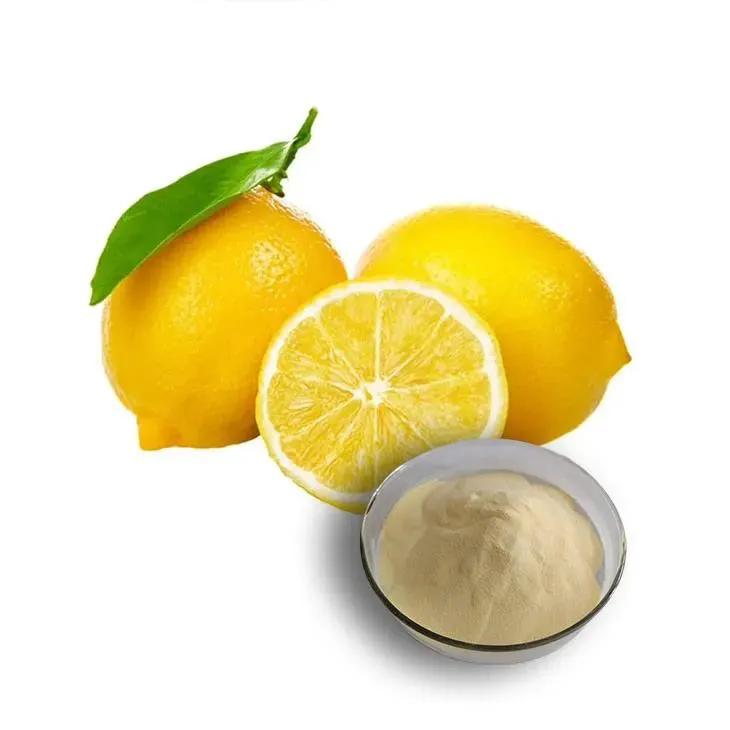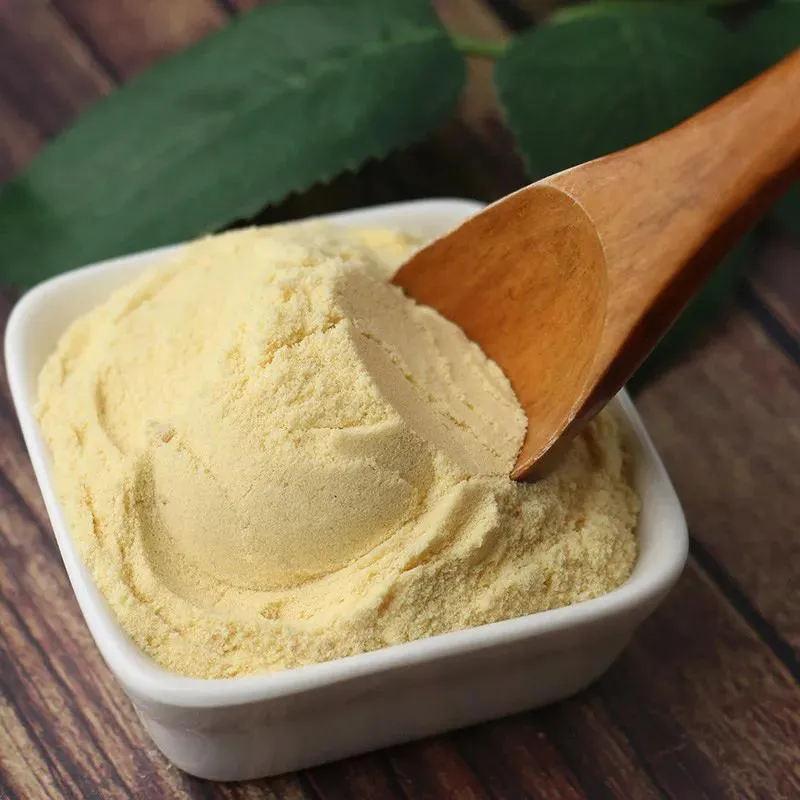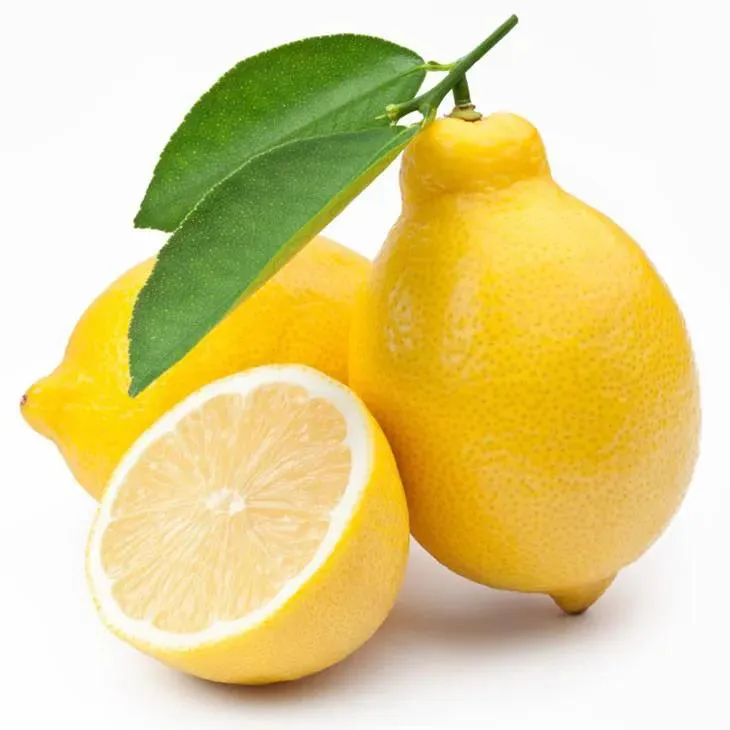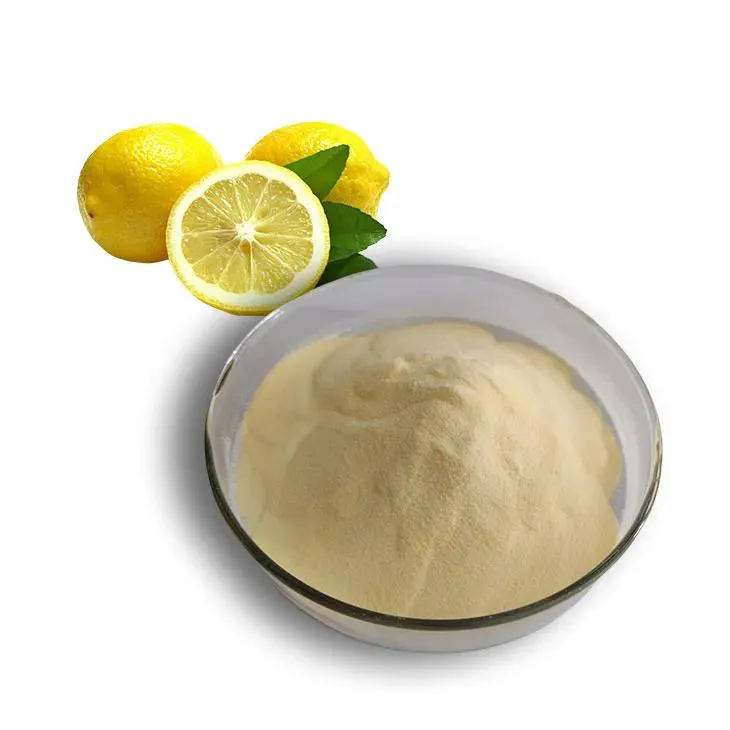- 0086-571-85302990
- sales@greenskybio.com
Best Answers to 7 Key Questions about Lemon Juice Powder.
2024-12-20

1. What is Lemon Juice Powder?
Lemon Juice Powder is a concentrated form of lemon juice. It is made by removing the water content from fresh lemon juice, leaving behind the essential flavor, acidity, and nutrients in a powdered form. This process allows for easier storage, transportation, and a longer shelf - life compared to fresh lemon juice. Lemon Juice Powder retains many of the characteristic properties of fresh lemon juice, such as its tangy flavor and its potential health benefits.

2. How is lemon juice powder made?
The process of making lemon juice powder typically involves the following steps:
- Harvesting: Fresh lemons are harvested at the appropriate ripeness. Lemons are carefully selected to ensure high quality.
- Juicing: The lemons are then juiced. This can be done using mechanical juicers that extract the juice while leaving behind the pulp, seeds, and peel.
- Evaporation: The lemon juice is then subjected to evaporation. This can be achieved through various methods such as spray drying or freeze - drying.
- In spray drying, the lemon juice is sprayed into a hot chamber. The water in the juice quickly evaporates, leaving behind fine powder particles.
- Freeze - drying involves freezing the lemon juice first and then removing the ice crystals through sublimation (the transition from solid to gas without passing through the liquid phase). This method is often considered to preserve more of the natural flavor and nutrients of the lemon juice.
- Packaging: Once the lemon juice has been dried into a powder, it is carefully packaged in air - tight containers to prevent moisture absorption and maintain its quality.

3. What are the potential health benefits of lemon juice powder?
Lemon juice powder offers several potential health benefits:
- Rich in Vitamin C: Just like fresh lemon juice, lemon juice powder is a good source of vitamin C. Vitamin C is an antioxidant that helps boost the immune system, protect cells from damage, and is involved in the production of collagen for healthy skin, bones, and connective tissues.
- Aids in Digestion: The acidity in lemon juice powder can stimulate the production of digestive juices in the stomach, which may help with digestion. It can also act as a mild laxative, promoting regular bowel movements.
- Alkalizing Effect: Despite its acidic nature, lemon juice powder has an alkalizing effect on the body once metabolized. This can help balance the body's pH levels, which is important for overall health.
- Weight Management: Some studies suggest that the compounds in lemon juice may help with weight management. It may increase feelings of fullness and boost metabolism slightly, although more research is needed in this area.

4. How can lemon juice powder be used in cooking and baking?
Lemon juice powder can be used in a variety of ways in cooking and baking:
- Seasoning: It can be used as a seasoning in savory dishes. Sprinkle it on fish, chicken, or vegetables to add a tangy lemon flavor. For example, a sprinkle of lemon juice powder on grilled salmon can enhance its taste without the mess of fresh lemon juice.
- Baking: In baking, it can be used in place of fresh lemon juice. Add it to cake batters, muffin mixes, or cookie dough to impart a lemon flavor. It is especially useful when you want a more concentrated lemon flavor or when fresh lemons are not available. For instance, in a lemon - poppy seed cake, lemon juice powder can be added to the dry ingredients to give a consistent lemon taste throughout the cake.
- Sauces and Dressings: Lemon juice powder can be used to make lemon - based sauces and dressings. For a simple salad dressing, combine lemon juice powder with olive oil, vinegar, salt, and pepper. It can also be used in lemon curd, adding a convenient way to achieve the desired lemon flavor without having to worry about the juice separating or spoiling quickly.
- Marinades: When used in marinades, lemon juice powder can tenderize meat and add flavor. Combine it with herbs, spices, and oil to create a marinade for pork, beef, or lamb. The acidity in the powder helps break down the proteins in the meat, making it more tender.

5. How does lemon juice powder compare to fresh lemon juice?
- Flavor: While both lemon juice powder and fresh lemon juice offer a tangy lemon flavor, the powder may have a more concentrated flavor. Fresh lemon juice has a more complex flavor profile due to the presence of additional volatile compounds that may be lost during the drying process. However, lemon juice powder can be a convenient alternative when a strong, consistent lemon flavor is desired.
- Nutrition: In terms of nutrition, both contain vitamin C and other beneficial compounds. However, fresh lemon juice may contain more water - soluble vitamins and enzymes that could be partially lost during the drying process of making the powder. Nevertheless, lemon juice powder still retains a significant amount of the nutrients found in fresh lemon juice.
- Convenience: Lemon juice powder is far more convenient. It has a long shelf - life and does not require refrigeration like fresh lemon juice. It is also easier to measure precisely, which is important in cooking and baking. On the other hand, fresh lemon juice offers the experience of using a natural, whole food product and may be preferred in certain applications where the freshest flavor is desired.
6. Are there any precautions when using lemon juice powder?
- Allergies: People who are allergic to lemons should avoid lemon juice powder. Allergic reactions can range from mild symptoms such as itching and hives to more severe reactions like difficulty breathing or anaphylaxis.
- Acidity: Due to its high acidity, excessive consumption of lemon juice powder may cause irritation to the digestive system. It is important to use it in moderation, especially for those with sensitive stomachs or pre - existing digestive conditions.
- Interaction with Medications: Lemon juice powder may interact with certain medications. For example, it could affect the absorption of some drugs. If you are taking medications, it is advisable to consult a healthcare provider before using lemon juice powder regularly.
7. Where can you buy lemon juice powder?
Lemon juice powder can be purchased from several sources:
- Grocery Stores: Many large grocery stores carry lemon juice powder in the spice or baking aisle. Look for well - known brands or store - brand equivalents.
- Health Food Stores: Health food stores are likely to stock lemon juice powder, especially those that focus on natural and organic products. These stores may offer a wider selection of high - quality lemon juice powders, including those made from organic lemons.
- Online Retailers: Online shopping platforms such as Amazon, eBay, and specialized food retailers offer a vast range of lemon juice powders. You can compare different brands, read customer reviews, and often find better deals online. When purchasing online, make sure to check the product details, such as the source of the lemons, the manufacturing process, and the expiration date.
FAQ:
Question 1: How is lemon juice powder made?
Lemon juice powder is typically made by first extracting the juice from fresh lemons. The juice is then dehydrated, often through processes like spray drying or freeze - drying. Spray drying involves spraying the juice in a fine mist into a hot chamber where the water evaporates quickly, leaving behind a powder. Freeze - drying, on the other hand, freezes the juice first and then removes the ice crystals through sublimation, also resulting in a powdered form.
Question 2: What are the main health benefits of lemon juice powder?
Lemon juice powder can offer several health benefits. It is rich in vitamin C, which is essential for a strong immune system, helps in collagen production for healthy skin, and acts as an antioxidant to protect cells from damage. It may also aid in digestion as it can stimulate the production of digestive juices. Additionally, the citric acid in lemon juice powder can potentially help in preventing kidney stones by increasing the citrate levels in urine.
Question 3: Can lemon juice powder be used as a substitute for fresh lemon juice in cooking?
Yes, it can be used as a substitute in many cases. However, it is important to note that the flavor profile might be slightly different. When rehydrated, lemon juice powder can provide a similar tangy flavor as fresh lemon juice. In baking, it can be used to add a lemony flavor to cakes, muffins, etc. In cooking, it can be used in sauces, marinades, and dressings, but the quantity might need to be adjusted according to personal taste.
Question 4: How should lemon juice powder be stored?
Lemon juice powder should be stored in a cool, dry place. It is best to keep it in an airtight container to prevent moisture absorption, which could cause clumping or spoilage. If stored properly, it can have a relatively long shelf life compared to fresh lemon juice.
Question 5: Is lemon juice powder suitable for people with certain dietary restrictions?
For the most part, lemon juice powder is suitable for many dietary restrictions. It is often vegan - friendly, as it is simply made from lemons. However, those who are on a low - acid diet may need to limit their intake, as it contains citric acid. Also, people with citrus allergies should avoid it.
Related literature
- The Health Benefits of Lemon - Based Products"
- "Production and Uses of Dehydrated Fruit Juices"
- "Lemon Juice in Nutrition and Culinary Arts"
- ▶ Hesperidin
- ▶ citrus bioflavonoids
- ▶ plant extract
- ▶ lycopene
- ▶ Diosmin
- ▶ Grape seed extract
- ▶ Sea buckthorn Juice Powder
- ▶ Beetroot powder
- ▶ Hops Extract
- ▶ Artichoke Extract
- ▶ Reishi mushroom extract
- ▶ Astaxanthin
- ▶ Green Tea Extract
- ▶ Curcumin Extract
- ▶ Horse Chestnut Extract
- ▶ Other Problems
- ▶ Boswellia Serrata Extract
- ▶ Resveratrol Extract
- ▶ Marigold Extract
- ▶ Grape Leaf Extract
- ▶ blog3
- ▶ blog4
- ▶ blog5
-
Pure 85% Tomentil Extract.
2024-12-20
-
Genistein
2024-12-20
-
Andrographis Paniculata Extract Powder
2024-12-20
-
Lycopene
2024-12-20
-
Giant Knotweed Extract
2024-12-20
-
Hawthorn powder
2024-12-20
-
Bilberry Extract
2024-12-20
-
Cat Claw Extract
2024-12-20
-
Scutellaria Extract
2024-12-20
-
Longan Extract
2024-12-20
-
Wheat Germ Extract
2024-12-20





















